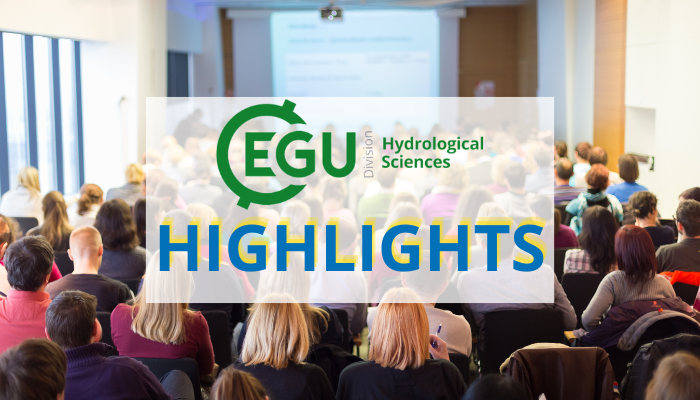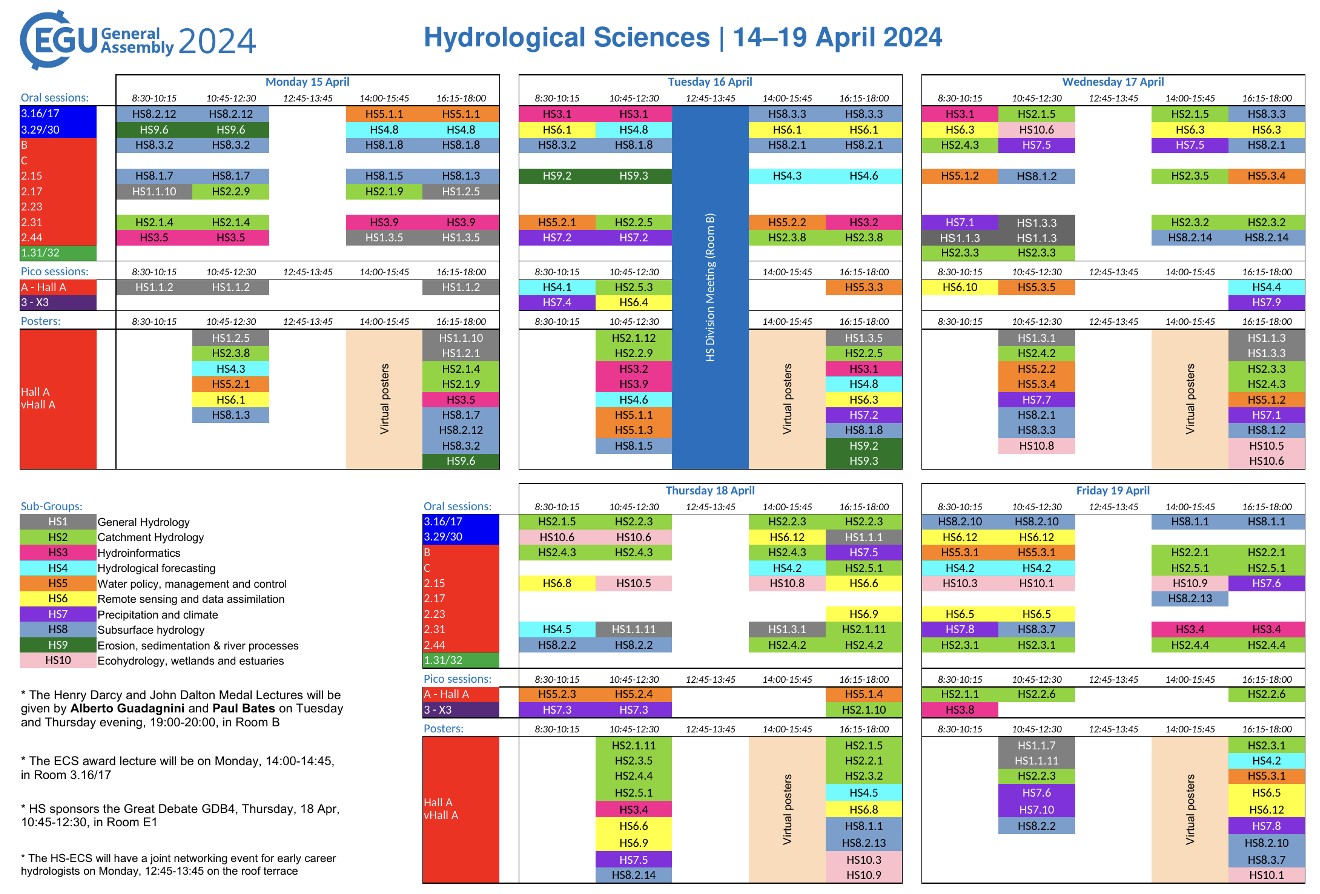
The EGU General Assembly 2024 will take place in a few days, on 14–19 April 2024, with more than 19,000 presentations (orals, posters, and PICOs) that will be delivered and viewed both on-site in Vienna (Austria Center Vienna) and virtually (through Zoom & Gather Town).
Format news this year:
- There are two on-site poster sessions per-day. The posters will be set up at the assigned poster board number at the start of time blocks 1 (8:30-10:15) and 3 (14:00-15:45). The scheduled attendance times are time blocks 2 (10:45-12:30) and 4 (16:15-18:00) respectively. Virtual posters of the day will be in Gather Town and attendance will be in time block 3 (14:00-15:45).
- For PICOs, after all presentations have been pitched, the virtual authors will remain on Zoom for a moderated discussion, accepting questions from the on-site and virtual audience members.
Check all format details here .
For the Hydrological Sciences (HS) Division, about 3,400 presentations are included in the 101 scientific sessions (of which 18 PICOs) that are led by the division. The 2024 conference programme is online, as you know, but how do we navigate through this broad choice of things to see?
How to Start
Whether you are planning to attend on-site or online, you need to take a couple of hours to prepare your own schedule for the week. It is time well spent, since it will help you later to get the most out of the conference.
Building your personal programme (here) is a good way to bring together session of your interest.
If this is your first time at an EGU General Assembly and, in particular, if you are an Early Career Scientist (ECS), then you should not miss these:
- SC1.1 – How to navigate the EGU: tips and tricks, Mon, 15 Apr, 10:45–12:30 (CEST), Room -2.61/62
- SC1.2 – How to get involved with EGU, Mon, 15 Apr, 14:00–15:45 (CEST), Room -2.61/62
- NET11 – First-time attendee Networking, Mon, 15 Apr, 18:00–19:00 (CEST), PICO spot 1
- HS ECS Networking Event, Mon, 15 Apr, 12:45–13:45, roof terrace
However, you can also prepare ahead of time by checking out this webinar, which was prepared by the ECS team of the Hydrological Sciences Division:
What Is in the HS Division Programme for 2024?
Our advice is to start your daily planning for EGU24 with the Hydrological Sciences programme, of course!
Something not to miss (a meeting point for EGU hydrologists) is our division meeting, where we present what we did in the past year; we say thank you for those officers who are ending their terms; we introduce the new officers; we vote on the composition of the division’s committees, etc.
The HS Division Meeting will be on Tue, 16 Apr, 12:45–13:45 (CEST) (Room B in Vienna & online).
Other meetings for the sub-programme groups of the HS Division can be found here (under SPM). In a nutshell:
- HS2 – Catchment hydrology. Thursday 18 April at 12:45 in room 2.32
- HS3 – Hydroinformatics. Wednesday 17 April at 12:30 in room 3.16/17
- HS4 – Hydrological Forecasting. Thursday 18 April at 16:15 in room 2.83
- HS5 – Water policy, management and control. Wednesday 17 April at 14:00 in room 2.32
- HS6 – Remote Sensing and Data Assimilation. Wednesday 17 April at 11:30 in room 2.32
- HS7 – Precipitation and climate. Wednesday 17 April at 18:00 in room 2.32
- HS8 – Subsurface hydrology. Friday 19 April at 12:45 in room 2.33
- HS9 – Erosion, sedimentation & river processes. Wednesday 17 April at 9:00 in room 2.32
- HS10 – Estuaries, wetlands & ecohydrology. Friday 19 April at 12:45 in room 2.32
For the scientific sessions and more, we have prepared the HS Schedule at a glance (click on image to open the pdf version):
For details, browse by session here, sorted by sub-groups. You can start with the HS Division and move on checking the sessions organized by the other EGU divisions to add more to your initial programme.
With the many presentations, our guess is that you will have a hard time to move from one session to another (in particular if you are attending on-site and the sessions are held on different floors), so here’s another piece of advice: Find one session you want to attend per time block (TB) and stick to it, eventually moving from one room to another during coffee/lunch breaks. Some difficult choices will have to be made, but you will probably enjoy the meeting more if you participate in the full discussions of a session (and you can always use the coffee breaks and networking time – from 18:00 to 19:00 – to exchange with other colleagues on what happened in sessions you missed!).
Additional Sessions for your Daily Planning
In addition to the HS Division schedule, you might also be interested in the following:
Monday 15 April
- US2 – Climate emergency, human agency: making sense of the current state of scientific knowledge on climate change to strengthen climate literacy. Mon, 15 Apr, 08:30–10:15 (CEST), Room E1
- MAL44-HS – HS Division Outstanding ECS Award Lecture by Andrea Cominola. Mon, 15 Apr, 14:00–14:45 (CEST), Room 3.16/17.
- SC2.2 – An introduction to science for policy. Mon, 15 Apr, 10:45–12:30 (CEST), Room -2.85/86
- SC5.2 – Geodesy 101. Mon, 15 Apr, 12:45–13:45 (CEST), Room 1.15/16
Tuesday 16 April
- MAL23-HS – Henry Darcy Medal Lecture by Alberto Guadagnini. Tue, 16 Apr, 19:00–20:00 (CEST), Room B
- DM12 – Division meeting for Hydrological Sciences (HS). Tue, 16 Apr, 12:45–13:45 (CEST), Room B
- Meet the co-chairs of the Programme Committee (Maria-Helena Ramos & Athanasios Nenes) and Events Manager (Jane Roussak) – Tue, 16 Apr, 10:00–11:00 (CEST), EGU booth – Hall X2
- Meet the Hydrological Sciences division team – Tue, 16 Apr, 15:30–16:00 (CEST), EGU booth – Hall X2
Wednesday 17 April
- MAL26-NH – Sergey Soloviev Medal Lecture by Hayley J. Fowler, Wed, 17 Apr, 10:50–11:20 (CEST), Room C
- MAL25-NH – Plinius Medal Lecture by Jacopo Selva. Wed, 17 Apr, 16:20–16:50 (CEST), Room C
- SC5.8 – Contemporary Topics in Geosciences: tipping points, causality, and multi-scale dynamics, Wed, 17 Apr, 19:00–20:00 (CEST), Room M1
- SC5.17 – How to enhance natural hazard scientists’ contribution to disaster risk reduction. Wed, 17 Apr, 14:00–15:45 (CEST), Room -2.85/86
- SC6.8 – Using distributed databases in your citizen science research. Wed, 17 Apr, 08:30–10:15 (CEST), Room -2.61/62
Thursday 18 April
- GDB4 – Early Warnings for All (EW4ALL) Initiative: science needs for the global ambition to protect everyone by 2027. Thu, 18 Apr, 10:45–12:30 (CEST), Room E1
- MAL24-HS – John Dalton Medal Lecture by Paul D. Bates. Thu, 18 Apr, 19:00–20:00 (CEST), Room B
- HS1.1.1 – (Ir-)relevant scales for future water resources, Thu, 18 Apr, 16:15–18:00 (CEST), Room 3.29/30
- SC3.7 – The Art of Communicating Risk: Tips for effective risk communication. Thu, 18 Apr, 19:00–20:00 (CEST), Room M2
- SC5.19 – Mastering Environmental Research through FAIR Data Integration, VREs and Open Science. Thu, 18 Apr, 19:00–20:00 (CEST), Room 1.15/16
- SC6.3 – Introduction to Python for Earth System Sciences. Thu, 18 Apr, 16:15–18:00 (CEST), Room -2.85/86
Friday 19 April
- GDB6 – If informing is not enough, how should scientists engage to accelerate the social transformation required by climate change and biodiversity collapse? Fri, 19 Apr, 14:00–15:45 (CEST), Room E1
- SC5.6 – Introduction to Information Theory. Fri, 19 Apr, 10:45–12:30 (CEST), Room -2.61/62
- SC5.7 – Introduction to neural networks. Fri, 19 Apr, 14:00–15:45 (CEST), Room -2.61/62
- SC6.9 – DataViz: Visualise your data effectively and avoid common pitfalls. Fri, 19 Apr, 14:00–15:45 (CEST), Room -2.85/86
Do You Want More?
Education and Outreach sessions (here); our (personal) selection:
- EOS1.1 – Science and Society: Science Communication Practice, Research, and Reflection
- EOS1.3 – Exploring the Art-Science Interface
- EOS1.5 – Games for Geoscience
- EOS1.7 – Challenges and opportunities in risk communication related to natural and anthropogenic hazards
- EOS2.7 – How can we activate and exploit the potential of citizen scientists for environmental monitoring? Strategies, tools and suitable sensors for citizen science
- EOS3.1 – Promoting and supporting equality, diversity and inclusion in the geosciences
- EOS4.7 – Sharing data, tools, and knowledge: resources and initiatives.
- EOS5.1 – GIFT 2024 – Geoscience Information For Teachers
Reminder for Authors/Presenters
- Don’t forget that you have to upload your presentation the latest 24h before your session starts! Check the home page to do it: https://www.egu24.eu/
- Presenter guidelines can be found here: https://egu24.eu/guidelines/presenters.html
Don’t forget to always keep an eye on the EGU24 website for updates, and follow us on Twitter.
We are looking forward to seeing you all in Vienna or online!
Alberto Viglione (HS Division President)
Maria-Helena Ramos (HS Division Deputy President and Programme Committee Co-chair)
Florentine Weber (HS Division ECS Rep)
Christina Orieschnig (HS Division Incoming ECS Rep)

